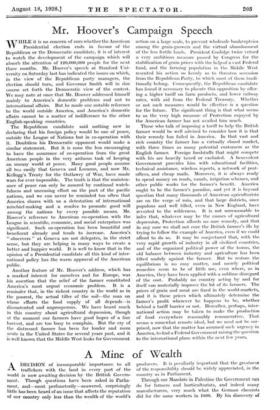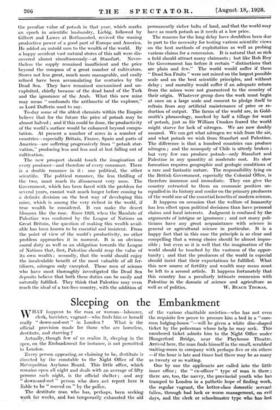A Mine of Wealth A DECISION of incomparable' importance to
all -4-3k- traffickers with the land in every part of the world is now awaiting decision by the British Govern- ment. Though questions have been asked in Parlia- ment, and—most perfunctorily—answered, surprisingly little has been heard of an issue that affects the reputation of our country only less than the wealth of the world's producers. It is peculiarly important that the greatness of the responsibility should be widely appreciated, in the country as in Parliament.
Through our Mandate in Palestine the Government can do for farmers and horticulturists, and indeed many manufacturers, very much what the German chemists did for the same workers in 1860. By his discovery of the peculiar value .of potash in that year, which marks an epoch in scientific husbandry, Liebig, followed by Gilbert and Lawes at Rothamsted, revived the waning productive power of a good part of Europe and America. He added an untold sum to the wealth of the world. By a happy accident vast natural stores of this salt were dis- covered almost simultaneously—at Stassfurt. Never- theless the supply remained insufficient and the price beyond the compass of a great number of cultivators. Stores not less great, much more manageable, and easily refined have been accumulating for centuries by the Dead Sea. They have remained unexamined and un- exploited, chiefly because of the dead hand of the Turk and the ignorance of the Arab. What this new mine may mean "confounds the arithmetic of the explorer," as Lord Dufferin used to say.
To-day some of the ablest chemists within the Empire believe that for the future the price of potash may be almost halved ; and if this could be done, the productivity of the world's surface would be enhanced beyond compu- tation. At present a number of acres in a number of countries—especially Britain, France, Spain and parts of America—are suffering progressively from "potash star- vation," producing less and less and at last falling out of cultivation.
The new prospect should touch the imagination of every producer—and therefore of every consumer. There is a double romance in it : one political, the other scientific. The political romance, the less thrilling of the two, must reach its denouement very soon. The Government, which has been faced with the problem for several years, cannot wait much longer before coming to a definite decision on the best way, of developing this mine, which is among the _very richest in the world, if true wealth be considered.. It. can make • the desert blossom like the rose. Since 1923, when the Mandate of Palestine was conferred by the League of Nations on Great Britain, the question of making this wealth avail- able has been known to be essential and insistent. From the point of view of the world's productivity, no other problem approaches it in moment. It is an obvious moral duty as well as an obligation towards the League of Nations that, first, Palestine should reap the value of its own wealth ; secondly, that the world should enjoy the incalculable benefit of the most valuable of all fer- tilizers, nitrogen only excepted. Those men of science who have most thoroughly investigated the Dead Sea deposits believe that both these duties can be easily and naturally fulfilled. They think that Palestine may even reach the ideal of a tax-free country, with the addition of permanently richer belts of land, and that the world may have as much potash as it needs at a low price.
The reasons for the long delay have doubtless been due in part to the necessity for testing various scientific views on the best methods of exploitation as well as probing various claims for a concession. It is natural that so rich a field should attract many claimants ; but like Rob Roy the Government has before it certain "distinctions that are plain and few." The world would suffer if, these "Dead Sea Fruits " were not mined on the largest possible scale and on the best scientific principles, and without delay ; and morality would suffer if an adequate return from the mines were not guaranteed to the country of their origin. Whatever group does the work must begin at once on a large scale and consent to pledge itself to refrain from any artificial maintenance of price or re- duction of output. The farms of the world are, in Gold- smith's phraseology, mocked by half a tillage -for want of potash, just as Sir William Crookes feared the world might starve for lack of nitrogen. We are now doubly assured. We can get what nitrogen we wish from the air, and what potash we wish from Stassfurt and Palestine. The difference is that a hundred countries can produce nitrogen ; and the monopoly of Chile is utterly broken ; but very few can produce potash--only Stassfurt and Palestine in any quantity at moderate cost. Its slow formation requires geographic and geologic conditions of a rare and fantastic nature. The responsibility lying on the British Government, especially the Colonial Office, is therefore immense and immediate. They can give the country entrusted to them an economic position un- equalled in its history and confer on the primary producers of the world one of theessentialhenefits of modern science:, It happens on occasion that the welfare of humanity has less effect upon political decisions than have personal claims and local interests. Judgment is confused, by the arguments of intrigue or ignorance ; and not many poli- ticians have any great acquaintance with science in general or agricultural science in particular. It is a happy fact that in this case the principle is so clear and compelling that a wrong choice should be almost impos- sible; but even so it is well that the imagination of the world should be touched by the vastness of the oppor- tunity; and that the producers of the world in especial should insist that their expectations be fulfilled. What this new source of fertility and wealth may mean must be left to a second article. It happens fortunately that this country has a peculiarly intimate -connexion with Palestine in the domain of science and agriculture as

































 Previous page
Previous page